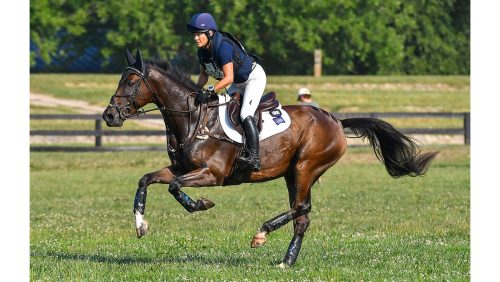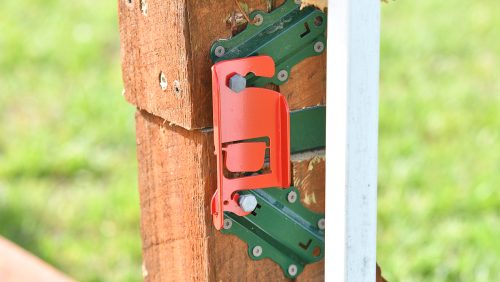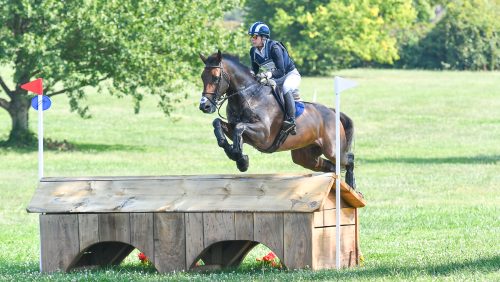Erin Roof-Wages credits horses with helping her through some of the most challenging times in her life. From a childhood move, through vet school and a rigorous oncology residency, and now, as she faces a rare form of cancer herself, horses have been her most constant grounding force.
When Roof-Wages was 7, her family moved from Houston to a remote, one-stoplight Texas town. She informed her parents that if they were taking her to the country, she wanted to ride a horse. They obliged, signing her up for weekly lessons.
“I think they thought it was a phase,” she said. “My dad actually offered, instead of buying a horse, to build me my own tennis court or ice rink. He thought either would be cheaper than having horses.”
But she had the bug, cleaning stalls in exchange for lessons and riding “anything [she] could get on.” By 10 she owned her first horse, a little Appendix gelding.

“I got eliminated at my first show with him,” she said, laughing. “I couldn’t understand how he’d jump around at home but stop on the cross-country course. There was a big learning curve, but I figured it out and got going.”
Roof-Wages’ mother was a little more on board with horses out of the gate.
“She loved knowing where I was,” Roof-Wages said. “When I was a teenager and boys would call the house, my mom loved telling them, ‘She’s at the barn, and she won’t be back until dark.’ She would have spent all the money to keep me in the barn!”
And by high school, Roof-Wages was committed to the sport. She had two horses, regularly competing in preliminary. By 17, she had learned to drive the truck and trailer so she could take herself to horse shows.
After graduation, Roof-Wages attended Texas A&M University, living with friends who also rode. Together, they shared a self-care boarding situation so their horses could be nearby. Roof-Wages evented through the intermediate level and did Young Riders during her college career, thanks to her willingness to put in the work both in the classroom and at the barn.
But when she entered veterinary school, she realized that riding would have to take a temporary backseat.
That self-described “break” meant a time-out from competing, but Roof-Wages still taught lessons at a barn near her school and rode other people’s horses, including starting a young horse for a friend. Being able to plan lessons and rides around her rigorous school schedule took the pressure off while keeping her in the barn.
Some time during vet school, Roof-Wages realized that she would eventually specialize in her career. She wanted to know a lot about one thing rather than a little bit about a lot of things, she said.
During a rotating internship, an oncology professor made the field so interesting that Roof-Wages knew the direction she wanted to take her career. She completed a three-year oncology residency, passed her boards, and has been working as a veterinary oncologist since 2012.
ADVERTISEMENT
“I mostly treat cats and dogs,” she said, “but I’m trained in all species. My most interesting patient was a tiger with skin lymphoma, and an associate is currently treating a seal. We see it all.”
“And it’s not really a sad field,” she continued. “We’re often the happiest people in the clinic, even though many days were talking about death and grief and loss. But we also get to turn around and tell people their pets are in remission. Oncologists are generally very hopeful people. We see amazing things happen all the time, and we want that for all of our patients.”

Roof-Wages’ expertise in the field of oncology has been a blessing as she’s faced a cancer diagnosis of her own, she said.
In early 2023, Roof-Wages was pregnant and miscarried. But tests showed that the pregnancy hormone hCG was continuing to rise. Doctors thought she could be pregnant again, but an ultrasound showed that wasn’t the case.
After numerous doctor visits, a dilation and curettage procedure, a barrage of additional tests and CT scans, Roof-Wages was diagnosed with gestational choriocarcinoma, a rare cancer caused when the tissue that would normally form the placenta turned cancerous.
She had a laparoscopic hysterectomy, but hCG levels kept going up. Scans were negative for metastasis, but her rising hCG levels showed that cancer was still present somewhere. It was time for chemo.
Roof-Wages was more than ready for this next step.
“It was so helpful for me to know exactly what’s going on,” she said. “I didn’t have the hang-ups that so many people around me did. I know exactly how this cancer behaves. I know exactly what this combination of chemo drugs will do to fight it, I know what side effects are, I know what to expect. When my oncologist suggested chemo, I was able to say, ‘Yeah, it’s time. Let’s go.’ ”
Roof-Wages received EMA-CO chemotherapy, a combination of five different chemo drugs, through a port in her chest every Thursday and every other Friday for three and a half months.
But she didn’t let it slow her down.
“I definitely went in with the attitude that I was going to continue living my life,” she said. “I wasn’t going to quit working or doing the things I loved. No one was going to tell me I couldn’t do something.”

Through chemo, Roof-Wages continued riding and competing her eventer Cooley One To Many, whom she’d gotten roughly a year earlier.
Friend and former trainer Rebecca Brown had been horse shopping in England—not for Roof-Wages—when she came across the now-16-year-old Irish Sport Horse gelding (Jack Of Diamonds—Taffin) who had competed at Badminton in 2023. Brown knew Roof-Wages was loosely looking for an advanced horse and thought he could be a great next partner. It only took a few videos for Roof-Wages to decide he was the one.
ADVERTISEMENT
“He’s the first horse I’ve had who has more experience than I do,” she said. “He’s been amazing.”
“Jack” is not without his quirks: He danced anxiously at the mounting block when he first arrived. Roof-Wages spent three months practicing mounting while a friend held a bucket of grain at the block, and he now stands quietly. (But when Roof-Wages realized that Jack’s anxiety would build just walking to the mounting block, she bought three more mounting blocks to keep throughout the arena.)
“You bring the block to him, not him to the block,” she said, laughing. “And you can’t lean over on him while riding, so don’t try adjusting your boot or checking his shoes. But he’s been so perfect otherwise, I’m happy to cater to his quirks.”
“He’s just been amazing under saddle,” she said. “I’ve learned that he appreciates if I ride with a ‘less is more’ attitude. He likes me to show him where we’re going and then let him do his job. He doesn’t like to be told that he’s wrong [with a distance or approach], so I just tell him he’s right all the time and I get out of his way. He takes care of me.”
Last fall, Roof-Wages had a 12-hour chemo infusion Thursday into Friday, then went to a show at Majestic Oaks in Ocala later that day with a friend.
“I was really tired, but Jack was like ‘I got this,’ ” she said. “I was just a passenger. He got us through, and we ended up winning the modified.”

In his own way, Jack cares for Roof-Wages at home, too, at the five-acre property in central Florida where she has lived since 2020 with her husband and 10-year-old daughter.
“Jack is very demanding,” she said. “Food is life. He’ll destroy his stall if I’m late for a meal, so I’m always on his schedule. No matter how I’m feeling, he gets me out of bed or off the couch and keeps me moving.”
But that being said, he’s forgiving under saddle. “I try to ride daily after work,” she said. “But If I miss a day, he doesn’t care. He’s very focused, and once you’re on, he’s like ‘OK, what are we doing?’”
Roof-Wages is acutely aware of Jack’s age, so she’s careful to pick and choose what they do together to keep him healthy and sound as long as possible. (But if she takes another horse off the farm for an adventure, Jack gets angry and yells at her over the fence.)
She and Jack competed in a CCI2*-S at Tryon (North Carolina) in May, and the Bates Preliminary Amateur Championship at the USEA American Eventing Championships in August, and she’s aiming to do a few intermediates this winter and a three-star in the spring. She also has some shows on her bucket list; AEC was one, and she’s eyeballing Rebecca Farm in Montana in 2025.

Roof-Wages finished chemo treatments in January 2024. Her port came out this summer, and her cancer is in remission.
No matter what direction life takes her next, she’ll stay in the saddle.
“When you’re riding a 1,200-pound animal, you can’t think about anything else or you’ll be on the ground,” she said. “You have to focus on you and your horse and the ride. There’s not room for anything else in your head. All other stress falls away. Riding and horses have been my outlet forever, and I can’t imagine life without them.”













